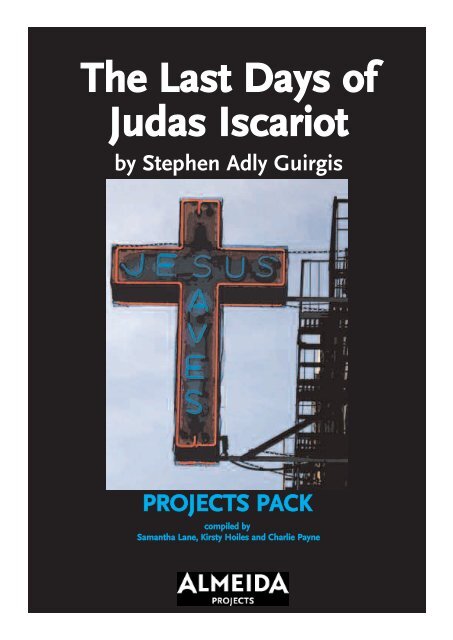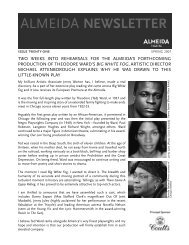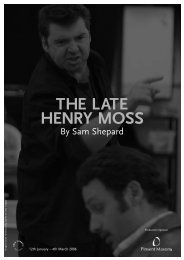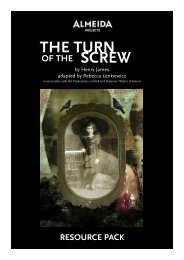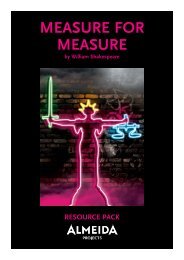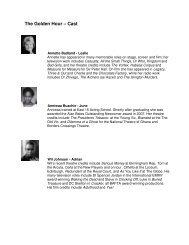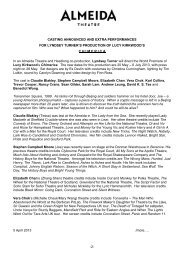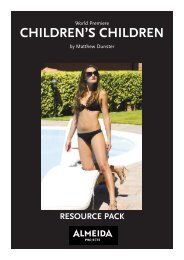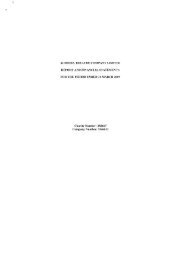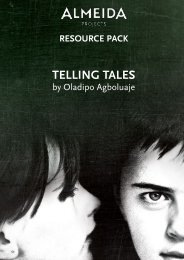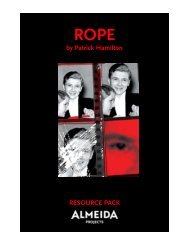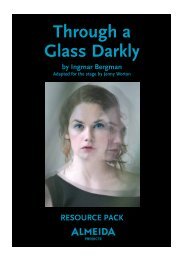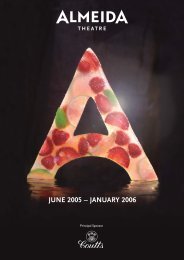The Last Days of Judas Iscariot - Almeida Theatre
The Last Days of Judas Iscariot - Almeida Theatre
The Last Days of Judas Iscariot - Almeida Theatre
Create successful ePaper yourself
Turn your PDF publications into a flip-book with our unique Google optimized e-Paper software.
<strong>The</strong> <strong>Last</strong> <strong>Days</strong> <strong>of</strong><br />
<strong>Judas</strong> <strong>Iscariot</strong><br />
by Stephen Adly Guirgis<br />
PROJECTS PACK<br />
compiled by<br />
Samantha Lane, Kirsty Hoiles and Charlie Payne
Welcome to the <strong>Almeida</strong> <strong>The</strong>atre’s production<br />
<strong>of</strong> <strong>The</strong> <strong>Last</strong> <strong>Days</strong> <strong>of</strong> <strong>Judas</strong> <strong>Iscariot</strong> by Stephen Adly Guirgis.<br />
Something exciting has been happening at the <strong>Almeida</strong>. In the<br />
rehearsal room a host <strong>of</strong> iconic figures have been engaging in a<br />
passionate and heated debate that has raged across the centuries.<br />
Satan has been seen in discussion with <strong>Judas</strong> <strong>Iscariot</strong> and Mother<br />
<strong>The</strong>resa has been making tea with Sigmund Freud. We are talking<br />
<strong>of</strong> course about rehearsals for the European Premiere <strong>of</strong> Stephen<br />
Adly Guirgis’ latest play <strong>The</strong> <strong>Last</strong> <strong>Days</strong> <strong>of</strong> <strong>Judas</strong> <strong>Iscariot</strong>, which at<br />
the time <strong>of</strong> writing were currently in full swing.<br />
<strong>Judas</strong> <strong>Iscariot</strong> feels alone. Vilified by all Christians for the last<br />
2000 years for his betrayal <strong>of</strong> Jesus Christ to the Roman<br />
authorities for thirty pieces <strong>of</strong> silver. For that act and for his<br />
subsequent suicide he has allegedly been condemned to hell for<br />
all eternity. It is a story with which we are all familiar. Perhaps the<br />
time has come for a reprieve Many others had their sins washed<br />
away by Jesus: many others were given the opportunity to start<br />
again. And are there not other figures that should bear their share<br />
<strong>of</strong> the blame And where better a venue for such a case to be tried<br />
than in a courtroom delicately poised between heaven and hell:<br />
as the attorney for <strong>Judas</strong>’ defence states, “This is Purgatory, …I’ve<br />
got all day.”<br />
Introduction<br />
Joseph Mawle<br />
Photo: Hugo Glendinning<br />
<strong>The</strong> <strong>Last</strong> <strong>Days</strong> <strong>of</strong> <strong>Judas</strong> <strong>Iscariot</strong> is not a play about one man’s guilt<br />
and another’s forgiveness; rather that through such a<br />
contemporary dramatic exploration <strong>of</strong> an ancient debate about<br />
celebrated figures, we as an audience are able to re-examine our<br />
own betrayals, our own personal lapses <strong>of</strong> belief, and who we<br />
need to look to for forgiveness.<br />
<strong>The</strong> <strong>Almeida</strong> Projects Team are really excited about exploring<br />
some <strong>of</strong> the key ideas and questions posed in <strong>The</strong> <strong>Last</strong> <strong>Days</strong> <strong>of</strong><br />
<strong>Judas</strong> <strong>Iscariot</strong>. Thanks to all <strong>of</strong> the creative team and the cast who<br />
have been so generous in their enthusiasm and support <strong>of</strong> the<br />
Projects work. We very much hope that you and your students are<br />
able to draw energy both from its ideas and the skill with which<br />
they are presented.<br />
We look forward to welcoming you to the <strong>Almeida</strong> soon.<br />
Samantha Lane and Charlie Payne<br />
<strong>Almeida</strong> Projects<br />
<strong>Almeida</strong> Projects: <strong>The</strong> <strong>Last</strong> <strong>Days</strong> <strong>of</strong> <strong>Judas</strong> <strong>Iscariot</strong> by Stephen Adly Guirgis<br />
2
ALMEIDA PROJECTS<br />
Under the artistic directorship <strong>of</strong> Michael Attenborough, the<br />
<strong>Almeida</strong> presents an eclectic programme, ranging from<br />
redefined major classics to the cutting edge <strong>of</strong> brand new work.<br />
Our Projects reflect the main programme's ambition by finding<br />
ways to challenge and excite our participants about the work you<br />
come to see at the <strong>Almeida</strong>. We hope to inspire you to approach<br />
your own theatre work in the same spirit <strong>of</strong> generosity and<br />
risk-taking that we encourage in our rehearsal room.<br />
PROJECTS PACK<br />
This pack aims to provide an insight into our process in taking<br />
the production from research stage to performance. We hope<br />
you will use it to help you in your own investigations into the<br />
play both before and after your visit to the <strong>Almeida</strong>. This pack<br />
contains quotations from the play which use strong language.<br />
Contents<br />
Workshops<br />
Before you see the production, one <strong>of</strong> our Projects Team may be<br />
visiting you for a workshop, bringing some <strong>of</strong> the techniques<br />
explored in the rehearsal room, the challenges the play presents<br />
and some questions. <strong>The</strong> sessions are designed to be practical<br />
and participatory so please come energised, ready to work and<br />
wearing appropriate clothes and shoes.<br />
Hosts<br />
When you come to the theatre, you will be met by one <strong>of</strong> the<br />
Projects Team who will be on hand to answer your questions and<br />
listen to your feedback about the production. Please do take<br />
advantage <strong>of</strong> this opportunity to find out more about how the<br />
production has evolved.<br />
PROJECTS PACK<br />
CONTENTS<br />
Dougkas Henshall<br />
Photo: Hugo Glendinning<br />
Introduction 2<br />
Contents 3<br />
Production Credits 4<br />
Plot Summary 5<br />
<strong>The</strong> Characters 10<br />
Stephen Adly Guirgis - the writer 13<br />
<strong>The</strong> Director & Headlong <strong>The</strong>atre 14<br />
Design - the model box 15<br />
In the Rehearsal Room 17<br />
Practical Exercises 19<br />
Context 21<br />
Language 23<br />
<strong>The</strong>mes & Discussion Points 24<br />
<strong>Almeida</strong> Projects 25<br />
<strong>Almeida</strong> Projects: <strong>The</strong> <strong>Last</strong> <strong>Days</strong> <strong>of</strong> <strong>Judas</strong> <strong>Iscariot</strong> by Stephen Adly Guirgis<br />
3
d<br />
Joseph Mawle and Douglas Henshall<br />
Photo: Hugo Glendinning<br />
<strong>The</strong> <strong>Last</strong> <strong>Days</strong> <strong>of</strong> <strong>Judas</strong> <strong>Iscariot</strong><br />
By Stephen Adly Guirgis<br />
Cast in order <strong>of</strong> speaking:<br />
Henrietta <strong>Iscariot</strong><br />
Gloria/Mother <strong>The</strong>resa<br />
Judge/St Peter<br />
Bailiff/Simon the Zealot<br />
Fabiana Aziza Cunningham<br />
Yusef Al-Fayoumy<br />
Saint Monica<br />
Loretta/Sister Glenna/<br />
Mary Magdalene<br />
Uncle Pino/Pontius Pilate<br />
Butch Honeywell<br />
<strong>Judas</strong> <strong>Iscariot</strong><br />
Matthias <strong>of</strong> Galilee/<br />
Sigmund Freud/St Thomas<br />
St Matthew/Caiaphas the Elder<br />
Satan<br />
Jesus <strong>of</strong> Nazareth<br />
Creative team:<br />
Director<br />
Design<br />
Lighting<br />
Composer and Sound<br />
Casting<br />
Assistant Director<br />
Amanda Boxer<br />
Dona Croll<br />
Corey Johnson<br />
John Macmillan<br />
Susan Lynch<br />
Mark Lockyer<br />
Jessika Williams<br />
Poppy Miller<br />
Ron Cephas Jones<br />
Shane Attwooll<br />
Joseph Mawle<br />
Josh Cohen<br />
Gawn Grainger<br />
Douglas Henshall<br />
Edward Hogg<br />
Rupert Goold<br />
Anthony Ward<br />
Howard Harrison<br />
Adam Cork<br />
Joyce Nettles<br />
Vik Sivalingam<br />
Production Credits<br />
Production Manager<br />
Company Manager<br />
Stage Manager<br />
Deputy Stage Manager<br />
Assistant Stage Manager<br />
Costume Supervisor<br />
James Crout<br />
Rupert Carlile<br />
Suzy Bourke<br />
Helen Bowen<br />
Laura Draper<br />
Iona Kendrick<br />
For <strong>Almeida</strong> Projects<br />
Director, <strong>Almeida</strong> Projects<br />
Projects Administrator<br />
Workshop Team:<br />
Samantha Lane<br />
Charlie Payne<br />
Kate Budgen<br />
Ned Glasier<br />
Amy Hodge<br />
Vik Sivalingam<br />
<strong>Almeida</strong> Projects: <strong>The</strong> <strong>Last</strong> <strong>Days</strong> <strong>of</strong> <strong>Judas</strong> <strong>Iscariot</strong> by Stephen Adly Guirgis<br />
4
Susan Lynch and Mark Lockyer<br />
Photo: Hugo Glendinning<br />
SUMMARY<br />
<strong>The</strong> <strong>Last</strong> <strong>Days</strong> <strong>of</strong> <strong>Judas</strong> <strong>Iscariot</strong> is a<br />
riotous courtroom drama, set in a corner<br />
<strong>of</strong> Purgatory called Hope (aka downtown<br />
New York City). <strong>The</strong> trial is between God<br />
and the Kingdom <strong>of</strong> Heaven and Earth<br />
versus <strong>Judas</strong> <strong>Iscariot</strong>. Fabiana Aziza<br />
Cunningham, the agnostic defence<br />
lawyer, obtains a writ from the God she<br />
isn’t sure she believes in, to force a<br />
retrial for <strong>Judas</strong>. Egyptian lawyer Yusef<br />
El-Fayoumy, up from Hell for the job,<br />
represents the prosecution. Various<br />
people are called to testify, from experts<br />
such as Mother <strong>The</strong>resa and Sigmund<br />
Freud, and direct witnesses including<br />
Simon the Zealot and Pontius Pilate, to<br />
Satan himself. Meanwhile <strong>Judas</strong> sits<br />
catatonic in a room in the ninth circle <strong>of</strong><br />
Hell, uncommunicative since his death,<br />
attended only – we later discover – by<br />
Jesus Christ.<br />
<strong>The</strong> play considers the conflict between<br />
divine mercy and human free will. If God<br />
is truly all-forgiving, why was <strong>Judas</strong> condemned<br />
to Hell for his betrayal <strong>of</strong> Jesus<br />
Christ and his subsequent suicide<br />
Act 1<br />
<strong>The</strong> play opens with a woman “emerging from the past”. She is the<br />
mother <strong>of</strong> <strong>Judas</strong> <strong>Iscariot</strong> who shares with the audience her grief at the<br />
death and lonely burial <strong>of</strong> her son <strong>Judas</strong>. She explains that she believes<br />
her son cannot be in hell, for if he is in hell then there is no God.<br />
We move to a courtroom in a corner <strong>of</strong> downtown purgatory called<br />
Hope. We meet Gloria, a woman who has acquired wings by working<br />
in Hope for two years. She describes flying back to earth to watch her<br />
family. She explains that the nature <strong>of</strong> Hope as a place has changed<br />
over the centuries and that in 2008 it is a courtroom where the souls<br />
are judged. Judge Littlefield dismisses case after case put before him<br />
including the case <strong>of</strong> God and the Kingdom <strong>of</strong> Heaven and Earth<br />
versus <strong>Judas</strong> <strong>Iscariot</strong>, submitted by a female Irish lawyer, Fabiana Aziza<br />
Cunningham, who has a writ signed by Saint Peter.<br />
Saint Monica appears in the court and explains that she has been<br />
enlisted by Cunningham to petition God on behalf <strong>of</strong> <strong>Judas</strong>. She both<br />
describes and re-enacts her visit to <strong>Judas</strong> and her attempts to goad<br />
him into defending his betrayal. In the re-enactment, <strong>Judas</strong> remains<br />
totally impassive and she sits with him for three days until she sees a<br />
single red tear fall from his eye. She explains how she looked into his<br />
eyes and detected a great sadness and held him in her arms for a<br />
further four days. On the fourth day he lets fall another single tear, and<br />
she decides that she has seen enough to petition to God on his behalf.<br />
St Monica describes leaving him her outer garments so he could smell<br />
something human and she also collected her own tears in a bucket<br />
and poured them over his face so that he could taste the salt.<br />
<strong>The</strong> Judge is still unwilling to try the case despite the eagerness <strong>of</strong><br />
Cunningham to defend it and El-Fayoumy to prosecute. <strong>The</strong> Judge<br />
doesn’t feel <strong>Judas</strong> is worthy <strong>of</strong> defence due to his betrayal and because<br />
he has not signed the writ himself. Cunningham eventually cites that<br />
the judge has been in Purgatory since 1864 when he took his own life<br />
on a battlefield in Georgia, and that the truths <strong>of</strong> his own case and that<br />
Plot Summary<br />
<strong>Almeida</strong> Projects: <strong>The</strong> <strong>Last</strong> <strong>Days</strong> <strong>of</strong> <strong>Judas</strong> <strong>Iscariot</strong> by Stephen Adly Guirgis<br />
5
Joseph Mawle and Edward Hogg<br />
Photo: Hugo Glendinning<br />
<strong>of</strong> <strong>Judas</strong> are not dissimilar. <strong>The</strong> Judge then schedules the case for the<br />
following morning.<br />
Plot Summary<br />
<strong>The</strong> world tells me that God is in<br />
heaven and my son is in hell. I<br />
tell the world the one true thing I<br />
know: If my son is in hell, then<br />
there is no heaven – because if<br />
my son sits in hell, there is no<br />
God.<br />
Henrietta <strong>Iscariot</strong><br />
Gloria appears again. She introduces Loretta who is on a life support<br />
machine on earth, and Butch Honeywell who is definitely dead. All<br />
three are on the jury and they briefly discuss their impressions <strong>of</strong> the<br />
case before they are called back to court.<br />
<strong>The</strong> first witness, Henrietta <strong>Iscariot</strong>, is called to the stand. It is<br />
revealed that <strong>Judas</strong> had been caught shop-lifting as a child. A scene<br />
between the eight year old <strong>Judas</strong> and his mother is played out before<br />
the court in which he admits to having sold the five fish he had caught<br />
to feed his hungry siblings to buy a spinning top for himself. <strong>The</strong><br />
defence council then asks Henrietta to describe the scene that took<br />
place the following day. We see a meeting between <strong>Judas</strong> ad Matthias<br />
<strong>of</strong> Galilee who describes how his family have been left impoverished<br />
and starving by the Romans. <strong>Judas</strong> gives him the spinning top. Finally<br />
the prosecution, El-Fayoumy, tells the court that <strong>Judas</strong> was later<br />
charged with stealing the staff from a blind man to buy cotton candy<br />
and another spinning top. <strong>The</strong> blind man was allegedly later knocked<br />
over and killed.<br />
Mother <strong>The</strong>resa is called to the stand by El-Fayoumy who flirts with<br />
her. He is so moved by her mere presence that the court is adjourned<br />
for five minutes.<br />
Saint Peter and Saint Matthew appear. Peter talks about the moment<br />
he first met Jesus, who he did not think looked like the Messiah. Jesus<br />
helped him fill his nets with fish when, as an expert fisherman, he had<br />
caught none all day. Jesus made him a fisher <strong>of</strong> men. Matthew<br />
explains that he was a Jewish tax collector for the Roman Empire, and<br />
he was therefore deemed a traitor to his people and considered<br />
unclean. It was against the law to look at him, but Jesus looked him<br />
in the eye and asked Matthew to follow him and he became clean<br />
again.<br />
Back in the court room El-Fayoumy explains how Mother <strong>The</strong>resa<br />
<strong>Almeida</strong> Projects: <strong>The</strong> <strong>Last</strong> <strong>Days</strong> <strong>of</strong> <strong>Judas</strong> <strong>Iscariot</strong> by Stephen Adly Guirgis<br />
6
Susan Lynch and Mark Lockyer<br />
Photo: Hugo Glendinning<br />
received a canonisation and a Nobel Peace Prize for her work with the<br />
poor and the sick. She explains how, when she was feeling great<br />
sadness that God didn’t want her and she was doubting that he was<br />
real at all, a fellow nun, Sister Glenna, spoke to her about the nature<br />
<strong>of</strong> despair. She says we should feel great sympathy for <strong>Judas</strong> if he is<br />
indeed in hell. She explains that he too has succumbed to despair<br />
which has prevented him from accepting happiness from the hands <strong>of</strong><br />
God. Cunningham then turns the tables on Mother <strong>The</strong>resa revealing<br />
the fact that she took money from corrupt sources for the poor, that<br />
she opposed abortion, and opposed taking a stance on anti Semitism.<br />
Cunningham herself has had two abortions, and she does not believe<br />
that Mother <strong>The</strong>resa belongs in heaven.<br />
Simon the Zealot is called to the stand. He explains that Zealots were<br />
opposed to any Gentiles in Palestine and were in favour <strong>of</strong> the strict<br />
adherence <strong>of</strong> Mosaic Law. He tells the court that <strong>Judas</strong> had Zealot<br />
beliefs. He describes the horrors <strong>of</strong> living under Roman oppression<br />
and that he and others believed Jesus had the power to overthrow<br />
them but did not do so. Simon believes <strong>Judas</strong> betrayed Jesus to the<br />
Romans as an attempt to shock him into action and fulfil his destiny<br />
as the saviour <strong>of</strong> the Jewish people. <strong>The</strong> defence suggests that Jesus<br />
gave <strong>Judas</strong> his permission to betray him at the last supper.<br />
Satan is called to the stand. He denies that he made <strong>Judas</strong> betray<br />
Jesus. He says that he appeared to <strong>Judas</strong> in a bar following the<br />
betrayal. <strong>Judas</strong> enters the playing space and the meeting is<br />
re-enacted. <strong>Judas</strong> does not recognise him and is in no mood to talk.<br />
<strong>Judas</strong> admires Satan’s shirt and persuades him to switch shirts with<br />
him. <strong>Judas</strong> says that he is afraid <strong>of</strong> going to hell for a minor incident<br />
that happened the night before (which we assume was the betrayal).<br />
Satan explains that Hell is merely an absence <strong>of</strong> God and that it isn’t<br />
so bad. He asks Satan what he thinks might happen to a person who<br />
has betrayed the Messiah. Satan suggests that it would be better for<br />
that person if he had never been born. Satan asks <strong>Judas</strong> about Jesus<br />
<strong>of</strong> Nazareth. <strong>Judas</strong> responds with, “Aw, fuck that guy, man - he’s a<br />
bitch!” <strong>The</strong> court is then adjourned for lunch.<br />
Plot Summary<br />
<strong>Judas</strong> was almost an alter-ego to<br />
Jesus – he was the shadow to<br />
Jesus’ light. He was the sour to<br />
the sweet and the cool to the<br />
warm.<br />
Mary Magdalene<br />
Act 2<br />
Saint Monica introduces Mary Magdalene. She describes herself as<br />
Jesus’ best friend, and also says that <strong>Judas</strong> was her favourite <strong>of</strong> the<br />
disciples. She describes the intense friendship between <strong>Judas</strong> and<br />
Jesus, and says that Jesus never talks about God’s abandonment <strong>of</strong><br />
<strong>Judas</strong> as he finds it too painful.<br />
Sigmund Freud is called by the defence. El-Fayoumy questions his<br />
expertise in the field <strong>of</strong> psychiatry. Cunningham questions him on the<br />
nature <strong>of</strong> suicide. Freud states that any victim <strong>of</strong> suicide must be<br />
pre-certified as psychotic and he agrees that <strong>Judas</strong> is therefore not<br />
responsible for his actions and that he does not belong in hell. He<br />
believes that the responsibility for the prevention <strong>of</strong> the tragedy rested<br />
with Jesus. El-Fayoumy attempts to devalue Freud’s statement by<br />
revealing the fact that he consumed massive quantities <strong>of</strong> cocaine,<br />
and that he was a confirmed atheist.<br />
Caiaphas the Elder is called to the witness stand by the prosecution.<br />
<strong>The</strong> Judge allows the Bailiff to preside over his testimony as he and<br />
Caiaphas were business partners and he feels he would not be<br />
objective. Caiaphas states that <strong>Judas</strong> approached him in order to<br />
betray Jesus and that in doing so <strong>Judas</strong> revealed himself to be neither<br />
loyal nor honest and therefore disobedient to the laws <strong>of</strong> the Torah:<br />
<strong>Judas</strong> had crossed the line. <strong>The</strong> defence lawyer, Cunningham, then<br />
questions the witness and states that in handing Jesus over to the<br />
<strong>Almeida</strong> Projects: <strong>The</strong> <strong>Last</strong> <strong>Days</strong> <strong>of</strong> <strong>Judas</strong> <strong>Iscariot</strong> by Stephen Adly Guirgis<br />
7
Joseph Mawle and Edward Hogg in rehearsal<br />
Photo: Hugo Glendinning<br />
Roman authorities, he was no different to <strong>Judas</strong>, in betraying a fellow<br />
Rabbi. Caiaphas claims that Jesus was disloyal and a blasphemer and<br />
that he did not know that Jesus would be killed. He handed him over<br />
for the protection <strong>of</strong> his own people but he insists that Jesus could have<br />
saved himself by retracting his blasphemous claims. <strong>The</strong> defence then<br />
asks why <strong>Judas</strong> was a traitor for handing over a man who was<br />
considered such a threat to the Jewish community. Caiaphas states it<br />
was the fact that he took thirty pieces <strong>of</strong> silver as payment.<br />
Cunningham states that <strong>Judas</strong> attempted to prevent Jesus’ death by<br />
returning the silver whereas Caiaphas did nothing. Caiaphas states to<br />
the prosecution that he is not interested in gaining forgiveness from<br />
anyone other than God; he feels instead that the writers <strong>of</strong> the Gospel<br />
are to blame for the persecution <strong>of</strong> the Jews for two thousand years, and<br />
that they are the ones that need forgiveness from him and his people.<br />
Plot Summary<br />
<strong>Judas</strong> was a dick, but he deserved<br />
better. Just one saint’s opinion.<br />
Saint Thomas<br />
<strong>Judas</strong> <strong>Iscariot</strong> had no remorse –<br />
his fear left no room for it. His<br />
fear was one hundred percent<br />
ego driven and self-serving. One<br />
hundred percent panic. Zero percent<br />
remorse. If you believe<br />
nothing else – believe that.<br />
Pontius Pilate<br />
<strong>The</strong> scene shifts away from the court room. Saint Thomas addresses<br />
the audience. He describes himself as a coward and a doubter. He<br />
explains that Jesus helped him with his faith when he didn’t feel he<br />
deserved it and yet he didn’t help <strong>Judas</strong> in the same way. He describes<br />
<strong>Judas</strong> as having both positive and negative qualities – he was incredibly<br />
loyal and very much a favourite <strong>of</strong> Jesus. <strong>Judas</strong>, unlike many <strong>of</strong> the<br />
other disciples, was never backward in coming forward and was not the<br />
kind <strong>of</strong> man to act out <strong>of</strong> greed.<br />
Back in the court room, Pilate is called to the stand for the defence.<br />
Pilate claims that he was merely trying to diffuse a potentially dangerous<br />
situation. He explains that he was ordered by the Roman Emperor<br />
Augustus to be the governor <strong>of</strong> Judea and he detested the place. Whilst<br />
in the job he oversaw seven hundred public executions but then<br />
Cunningham points out that the Crucifixion <strong>of</strong> Jesus was the only one<br />
<strong>of</strong> which he publicly washed his hands. Cunningham sites Pilate’s<br />
hatred <strong>of</strong> Judea and the Jewish race as a motivation for killing so many<br />
including Jesus. Pilate retorts that he was impressed by Jesus’ courage<br />
and integrity and that he had no intention <strong>of</strong> giving him more than a<br />
beating but that the two hundred thousand Jewish people who had converged<br />
on the city were hungry for revenge and he ordered the death <strong>of</strong><br />
Jesus to appease them and retain a level <strong>of</strong> order: he was simply doing<br />
his job. Finally he is asked by El-Fayoumy whether he thought <strong>Judas</strong> was<br />
recanting out <strong>of</strong> fear or genuine remorse. Pilate replies that <strong>Judas</strong>’ fear<br />
was so great that it left no room for genuine remorse.<br />
Satan is called back to the stand once again by the defence. Satan says<br />
he wishes to file a complaint that God is stealing souls from him. <strong>The</strong><br />
<strong>Almeida</strong> Projects: <strong>The</strong> <strong>Last</strong> <strong>Days</strong> <strong>of</strong> <strong>Judas</strong> <strong>Iscariot</strong> by Stephen Adly Guirgis<br />
8
Corey Johnson and Douglas Henshall<br />
Photo: Hugo Glendinning<br />
<strong>The</strong>re’s a concept, Cunningham,<br />
called “playing the card you are<br />
dealt” – one can either accept that<br />
concept, or, one can slowly lose<br />
their mind, heart and soul.<br />
Satan<br />
jury are led out <strong>of</strong> the court while Satan is reprimanded by the judge.<br />
Satan demands that this be the last time he is called to give testimony<br />
in a trial and he asks for two souls to take with him when he leaves to<br />
replace the two that have been stolen. He also demands painkillers and<br />
a large shot <strong>of</strong> whiskey. He then proceeds to level a string <strong>of</strong> deeply<br />
personal abuse at both Cunningham and El-Fayoumy before the jury are<br />
led back into the court. Satan denies that he has an ongoing feud with<br />
God and states instead that he loves him. He also states that he was<br />
created by God in the first three days as an angel who witnessed the<br />
creation <strong>of</strong> the earth; God then created man and gave him dominion<br />
over the earth and ordered the devil to serve man. Cunningham then<br />
states that the devil tempted Eve to eat the apple from the tree <strong>of</strong><br />
knowledge to prove to God that he had made a mistake in giving man<br />
power over the earth, at which point he fell from heaven. Satan says<br />
that he doesn’t compete with God for the souls <strong>of</strong> man, but just sits<br />
back and watches as God competes with himself. By giving humans<br />
free will they destroy themselves. He reconciles being thrown from<br />
heaven by acknowledging that one must accept the cards one is dealt.<br />
Cunningham insists that his testimony is a lie. Satan states that God<br />
loves all the creatures he created including himself and <strong>Judas</strong>, and the<br />
only thing stopping <strong>Judas</strong> leaving hell is his own despair. Cunningham<br />
refuses to believe this is a true statement and insists that Satan<br />
acknowledge that he is lying and that God is either powerless or<br />
spiteful. He suggests she address her own lack <strong>of</strong> faith.<br />
We see Jesus making his way to <strong>Judas</strong>. He explains that he is in<br />
everyone, both good and evil and that he loves every last one <strong>of</strong> us.<br />
<strong>The</strong>refore if we hate what he loves we do not really know or understand<br />
him at all. Jesus tells <strong>Judas</strong> that he misses him and that his grief is<br />
worse than being kicked by a thousand strangers. <strong>Judas</strong> expresses his<br />
fury that Jesus helped every stranger and all the other disciples but not<br />
him. Jesus states that if he knew that by helping him it would have<br />
changed <strong>Judas</strong>’ mind then he would have done so. <strong>Judas</strong> describes that<br />
it was Jesus’ behaviour in the temple that made <strong>Judas</strong> love him. Jesus<br />
explains that <strong>Judas</strong> has been with him in heaven ever since his<br />
ascension. He then makes the devil appear and asks <strong>Judas</strong> to touch<br />
him; he explains that Satan is nothing but an apparition. He insists that<br />
<strong>Judas</strong> look him in the eye and tell him that he doesn’t love him. <strong>Judas</strong><br />
does just this. Jesus insists that he has always loved <strong>Judas</strong> and that he<br />
never left him and it appears to be <strong>Judas</strong>’ own despair that stops him<br />
from reaching out to Jesus. <strong>Judas</strong> senses Jesus is leaving him and asks<br />
him to stay with him, but Jesus insists he is still there; <strong>Judas</strong> says he<br />
can’t see Jesus’ hands to take them but Jesus insists they are right there<br />
in front <strong>of</strong> him.<br />
Plot Summary<br />
She was my poem, Mr. <strong>Iscariot</strong>.<br />
Her and the kids. But mostly …<br />
her … You cashed in silver, Mr.<br />
<strong>Iscariot</strong>, but me Me, I threw<br />
away gold … that’s a fact.<br />
Butch Honeywell<br />
Butch Honeywell appears, carrying the remainder <strong>of</strong> a twelve pack <strong>of</strong><br />
beer for <strong>Judas</strong>. He tells <strong>Judas</strong> that the jury found him guilty. Butch then<br />
explains that while he believes he is actually dead, he is afraid as he<br />
does not feel that his soul is ready for judgement. He then recounts the<br />
story <strong>of</strong> how he met his wife at a party. When he first met her he felt<br />
she was too good for him. On the way home from their first date, he<br />
stopped outside <strong>of</strong> the house <strong>of</strong> a friend <strong>of</strong> his who had died. This<br />
upset him so much, he found himself crying in the arms <strong>of</strong> his<br />
wife-to-be. Three years into his marriage he cheated on his wife. She<br />
never knew anything about it and the immense guilt that he felt led him<br />
to further alcohol-fuelled betrayals as they were the only things that<br />
seemed to make him feel better. He compares <strong>Judas</strong>’ betrayal <strong>of</strong> Jesus<br />
to that <strong>of</strong> his own <strong>of</strong> his wife: he says <strong>Judas</strong> may have cashed in silver<br />
but that he threw away gold.<br />
<strong>Almeida</strong> Projects: <strong>The</strong> <strong>Last</strong> <strong>Days</strong> <strong>of</strong> <strong>Judas</strong> <strong>Iscariot</strong> by Stephen Adly Guirgis<br />
9
Henrietta <strong>Iscariot</strong> (Amanda Boxer)<br />
Mother <strong>of</strong> <strong>Judas</strong> <strong>Iscariot</strong>.<br />
Judge Littlefield (Corey Johnson)<br />
Presides over the courtroom in Hope.<br />
A citizen <strong>of</strong> Purgatory since 1864 when he<br />
hung himself from a tree on a battlefield in<br />
Allatoona, northern Georgia.<br />
Gloria (Dona Croll)<br />
A woman with wings.<br />
She has been in Purgatory for two years.<br />
She is a Jury member.<br />
<strong>The</strong> Characters<br />
Saint Peter (Corey Johnson)<br />
A fisherman.<br />
One <strong>of</strong> the Twelve Apostles.<br />
Fabiana Aziza Cunningham (Susan Lynch)<br />
Half Irish Catholic, half Romanian Gypsy.<br />
Attorney for the defence.<br />
Yusef El-Fayoumy<br />
AKA: Yusef Akbar Azziz Al-Nassar<br />
Gamel El-Fayoumy.<br />
Lives in Hell but temporarily<br />
detained in Purgatory.<br />
Attorney for the prosecution.<br />
Butch Honeywell (Shane Attwooll)<br />
Chairman <strong>of</strong> the Jury.<br />
Loretta (Poppy Miller)<br />
On a life support machine on earth.<br />
She is a Jury member.<br />
<strong>Almeida</strong> Projects: <strong>The</strong> <strong>Last</strong> <strong>Days</strong> <strong>of</strong> <strong>Judas</strong> <strong>Iscariot</strong> by Stephen Adly Guirgis<br />
10
Saint Monica (Jessika Williams)<br />
Mother <strong>of</strong> Saint Augustine.<br />
Simon the Zealot (John Macmillan)<br />
One <strong>of</strong> the Twelve Apostles.<br />
Bailiff (John Macmillan)<br />
AKA: Julius <strong>of</strong> Outer Mongolia.<br />
An <strong>of</strong>ficer <strong>of</strong> the court.<br />
<strong>The</strong> Characters<br />
Mother <strong>The</strong>resa (Dona Croll)<br />
An Albanian Born nun who devoted her life to<br />
caring for the sick and poverty stricken in the<br />
slums <strong>of</strong> Calcutta.<br />
Soon to be canonised.<br />
Recipient <strong>of</strong> a Nobel Peace Prize.<br />
Saint Matthew (Gawn Grainger)<br />
Formally a Jewish tax collector for the<br />
Roman Empire.<br />
One <strong>of</strong> the Twelve Apostles.<br />
Sister Glenna (Poppy Miller)<br />
An Irish nun.<br />
One <strong>of</strong> the Sisters <strong>of</strong> Loretto and<br />
a friend <strong>of</strong> Mother <strong>The</strong>resa.<br />
Mary Magdalene (Poppy Miller)<br />
AKA: Mary <strong>of</strong> Magdala<br />
An unmarried woman.<br />
A disciple <strong>of</strong> Jesus.<br />
Present at the crucifixion and the<br />
first person to whom Jesus<br />
appeared after the resurrection.<br />
Saint Thomas (Josh Cohen)<br />
One <strong>of</strong> the Twelve Apostles.<br />
Matthias <strong>of</strong> Galilee (Josh Cohen)<br />
An 8 year old boy.<br />
<strong>Almeida</strong> Projects: <strong>The</strong> <strong>Last</strong> <strong>Days</strong> <strong>of</strong> <strong>Judas</strong> <strong>Iscariot</strong> by Stephen Adly Guirgis<br />
11
Sigmund Freud (Josh Cohen)<br />
Founder <strong>of</strong> Psychoanalysis, a<br />
key theorist <strong>of</strong> modern<br />
psychiatry.<br />
Pontius Pilate (Ron Cephas Jones)<br />
Official title Heg-e-Mon meaning<br />
Excellency.<br />
A Roman.<br />
<strong>The</strong> fifth prefect <strong>of</strong> Judea governing<br />
from 26 – 36 AD.<br />
Caiaphas the Elder (Gawn<br />
Grainger)<br />
A Jewish Rabbi.<br />
Appointed High Priest <strong>of</strong> the<br />
Sanhendrin in 18CE and presiding<br />
during the betrayal and<br />
subsequent death <strong>of</strong> Jesus.<br />
<strong>The</strong> Characters<br />
<strong>Judas</strong> <strong>Iscariot</strong> (Joseph Mawle)<br />
One <strong>of</strong> the Twelve Apostles<br />
Betrayed Jesus to the Romans for 30 pieces <strong>of</strong><br />
silver.<br />
Committed suicide by hanging himself from an<br />
olive branch.<br />
Jesus <strong>of</strong> Nazareth (Edward Hogg)<br />
A Jewish Rabbi and carpenter.<br />
Son <strong>of</strong> Mary the Virgin.<br />
<strong>The</strong> father <strong>of</strong> Christianity.<br />
Satan (Douglas Henshall)<br />
AKA : <strong>The</strong> Prince <strong>of</strong> Darkness.<br />
Originally created by God as an Angel and then ordered to<br />
serve man. Responsible for persuading Eve to eat the<br />
apple from the tree <strong>of</strong> knowledge in the Garden <strong>of</strong> Eden at<br />
which point he fell from heaven to preside over hell.<br />
<strong>Almeida</strong> Projects: <strong>The</strong> <strong>Last</strong> <strong>Days</strong> <strong>of</strong> <strong>Judas</strong> <strong>Iscariot</strong> by Stephen Adly Guirgis<br />
12
Stephen Adly Guirgis<br />
<strong>The</strong> Writer and the LAByrinth<br />
Stephen Adly Guirgis is a product <strong>of</strong> New York City. He was<br />
the son <strong>of</strong> an Irish Catholic mother and an Egyptian father<br />
who moved to New York in 1963 and settled on the Upper<br />
West side.<br />
“I’ve lived my entire life in New York, and it informs<br />
everything … September 11 reinforced for me that whatever I’m<br />
writing about, it better be something that really matters to me<br />
because we don’t know what is going to happen tomorrow. And<br />
for me it’s stories about people in pain in New York.”<br />
Stephen Adly Guirgis<br />
New York Times Interview<br />
He went to a Catholic school on 121st Street in Harlem and<br />
then attended the Rhodes School on a scholarship. Guirgis<br />
then studied at the State University <strong>of</strong> New York at Albany<br />
where he was able to pursue his interest in theatre and meet<br />
fellow student and actor John Oritz. In 1993 Oritz persuaded<br />
Guirgis to audition for a new acting company which began as<br />
the Latino Actors Base (LAB). Guirgis was one <strong>of</strong> the first<br />
non-Latino actors invited to join and he felt immediately at<br />
home. <strong>The</strong> LAB soon became the LAByrinth theatre company.<br />
It was originally set up as a meeting/workshop space for<br />
actors to share techniques and workshop plays written by<br />
members. Although it has since blossomed in to a thriving<br />
multi-ethnic theatre group, producing a great deal <strong>of</strong> original<br />
work, its original purpose remains the same. All <strong>of</strong> Guirgis’<br />
work up to and including <strong>The</strong> <strong>Last</strong> <strong>Days</strong> <strong>of</strong> <strong>Judas</strong> <strong>Iscariot</strong> has<br />
been nurtured, created and ultimately premiered by LAByrinth<br />
under the direction <strong>of</strong> Oscar winning film actor Philip Seymor-<br />
H<strong>of</strong>fman.<br />
Stephen Adly Guirgis<br />
Other published plays by Stephen Adly Guirgis<br />
In Arabia, We’d All Be Kings (1999)<br />
Den <strong>of</strong> Thieves (2002)<br />
Jesus Hopped the ‘A’ Train (2002)<br />
Our Lady <strong>of</strong> 121st Street (2003)<br />
<strong>Almeida</strong> Projects: <strong>The</strong> <strong>Last</strong> <strong>Days</strong> <strong>of</strong> <strong>Judas</strong> <strong>Iscariot</strong> by Stephen Adly Guirgis<br />
13
Rupert Goold<br />
HEADLONG: /hedl’ong/ noun<br />
1. with head first, 2. starting<br />
boldly, 3, to approach with<br />
speed and vigour<br />
Director Rupert Goold saw <strong>The</strong> <strong>Last</strong> <strong>Days</strong> <strong>of</strong> <strong>Judas</strong> <strong>Iscariot</strong> when<br />
LAByrinth premiered the piece in New York in 2006 and, as a<br />
long-standing admirer <strong>of</strong> Adly Guirgis’ writing, immediately<br />
began discussions to bring the play to the UK. Goold is Artistic<br />
Director <strong>of</strong> the touring company Headlong <strong>The</strong>atre and he<br />
approached the <strong>Almeida</strong>’s Artistic Director Michael<br />
Attenborough to see if the two companies could work together<br />
to find a home for the play’s European premiere. <strong>The</strong> resulting<br />
production will mark the first co-production since Michael<br />
became Artistic Director.<br />
<strong>The</strong> last six months have seen the creative teams at both the<br />
<strong>Almeida</strong> and Headlong working with Stephen to further develop<br />
the script for the new production. We have met with both British<br />
and American performers to cast the production and found an<br />
extraordinary international ensemble for the show. <strong>The</strong><br />
production will also reunite the creative team behind 2007’s<br />
acclaimed Macbeth in the West End – Designer Anthony Ward,<br />
Lighting Designer Howard Harrison and Composer and Sound<br />
Designer Adam Cork.<br />
<strong>The</strong> European Premiere <strong>of</strong> <strong>The</strong> <strong>Last</strong> <strong>Days</strong> <strong>of</strong> <strong>Judas</strong> <strong>Iscariot</strong> is a<br />
major theatrical event and both Headlong and the <strong>Almeida</strong> are<br />
proud and delighted to be presenting this work together.<br />
Headlong is one <strong>of</strong> the UK’s leading touring theatre companies.<br />
Under Rupert Goold’s leadership it has established a reputation<br />
for ambitious, provocative work on a large scale. Recently<br />
acclaimed shows include the national tours <strong>of</strong> Paradise Lost,<br />
Angels in America, Simon Schama’s Rough Crossings and a<br />
reimagined version <strong>of</strong> Marlowe’s FAUSTUS, featuring Jake and<br />
Dinos Chapman.<br />
“Tackling issues with extraordinary theatrical audacity… a company<br />
that clearly intends to continue boldly”<br />
Financial Times on Headlong<br />
Ben Power – Literary Manager, Headlong<br />
<strong>The</strong> Director & Headlong <strong>The</strong>atre<br />
<strong>Almeida</strong> Projects: <strong>The</strong> <strong>Last</strong> <strong>Days</strong> <strong>of</strong> <strong>Judas</strong> <strong>Iscariot</strong> by Stephen Adly Guirgis<br />
14
Design<br />
<strong>The</strong> <strong>Almeida</strong> <strong>The</strong>atre - empty space<br />
Photo: Lara Platman<br />
<strong>The</strong> <strong>Almeida</strong> is a “found space”, and was not originally built as<br />
theatre. Designing for our theatre requires great ingenuity because<br />
there is no conventional backstage space (wings), nor is there a fly<br />
tower to allow us to lower and raise big pieces <strong>of</strong> scenery. This means<br />
each designer has to choose whether to reveal the building as it was, or<br />
to transform it into a conventional theatre space. In <strong>The</strong> <strong>Last</strong> <strong>Days</strong> <strong>of</strong><br />
<strong>Judas</strong> <strong>Iscariot</strong>, designer Anthony Ward has decided not to hide the building’s<br />
brick wall. We do have an area under the stage (substage) where<br />
actors exit to and enter from. It is also where props are kept and where<br />
quick costume changes take place. We can also cut holes in the floor for<br />
trapdoors through which to raise and lower set items, and even characters<br />
like Satan and Jesus in this particular play.<br />
<strong>The</strong> model box from below<br />
Designer: Anthony Ward<br />
Photo: Stage Management<br />
<strong>Almeida</strong> Projects: <strong>The</strong> <strong>Last</strong> <strong>Days</strong> <strong>of</strong> <strong>Judas</strong> <strong>Iscariot</strong> by Stephen Adly Guirgis<br />
15
h<br />
Design<br />
<strong>The</strong> model box from above<br />
Designer: Anthony Ward<br />
Photo: Stage Management<br />
Now Hope, it changes with the times,<br />
but has stood always as God’s gift to<br />
the last <strong>of</strong> his children. It is said that<br />
every generation rearranges the cosmic<br />
furniture differently … Today,<br />
Hope is no longer a place for<br />
contemplation – “litigation” being the<br />
preferred new order <strong>of</strong> the day.<br />
Gloria<br />
THE MODEL BOX<br />
<strong>The</strong> model box is a scaled down 1:25<br />
version <strong>of</strong> what the set will look like<br />
in the theatre. This is created mainly<br />
for use by the production team, the<br />
setbuilders and painters, and the<br />
lighting designer as a reference. It is<br />
also useful for the actors and director<br />
when thinking about how to stage<br />
the production.<br />
Stephen Adly Guirgis posits that most <strong>of</strong> today's great decisions<br />
are made in courtrooms, so he set his play in one - specifically,<br />
one in downtown Purgatory (known as Hope), the place where<br />
troubled souls wait (sometimes for a very long time) to be<br />
permanently assigned to either heaven or hell. By using the<br />
conventions <strong>of</strong> courtroom drama, he is able to explore such a big<br />
and complex theme in a recognisable form that we are already<br />
aware <strong>of</strong> from TV and cinema. Yet does this courtroom need to<br />
be a literal one<br />
At designer Anthony Ward’s model box presentation to the cast<br />
on the first day <strong>of</strong> rehearsals, Rupert Goold explained how the set<br />
is deliberately removed from a literal American courtroom<br />
environment and given an organic feel. <strong>The</strong> set is divided into<br />
three areas – above is heaven, the stage itself represents<br />
purgatory, and substage is hell. <strong>The</strong> architecture is epic in<br />
proportions, giving the impression <strong>of</strong> an infinite courtroom,<br />
infinite purgatory – a bottomless pit on stage. <strong>The</strong> floor is<br />
broken, smashed and full <strong>of</strong> rubble, giving an explosive quality<br />
that perfectly juxtaposes the moments <strong>of</strong> stillness in the play.<br />
<strong>The</strong> stage is wide and open and the audience can consequently<br />
see, and make judgement on the events on stage – just like a jury.<br />
<strong>The</strong> gallery style seating at the <strong>Almeida</strong> further enhances their<br />
role as onlookers.<br />
<strong>The</strong> set also makes use <strong>of</strong> multimedia technology – the upper<br />
area, or ‘heaven,’ is enclosed by a large, semi-circular screen that<br />
projects numerous images throughout the play, from the streets<br />
<strong>of</strong> New York to clouds, giving further epic proportions to the<br />
courtroom. It is also used to introduce Satan – who enters the<br />
courtroom for the first time through the trapdoor, literally rising<br />
from the depths <strong>of</strong> hell.<br />
<strong>The</strong> whole set is very mystical and suggest a feeling <strong>of</strong><br />
abandonment – a kind <strong>of</strong> Nietzschean ‘God is dead’ quality.<br />
<strong>Almeida</strong> Projects: <strong>The</strong> <strong>Last</strong> <strong>Days</strong> <strong>of</strong> <strong>Judas</strong> <strong>Iscariot</strong> by Stephen Adly Guirgis<br />
16
Jessika Williams and Joseph Mawle in rehearsal<br />
Photo: Hugo Glendinning<br />
Assistant Director Vik Sivalingam tells us what's happening in the<br />
rehearsal room:<br />
Rehearsal Weeks 1 & 2<br />
<strong>The</strong> first day began with the obligatory meet and greet, where the<br />
company meets the rest <strong>of</strong> the permanent <strong>Almeida</strong> staff. In an<br />
established building like the <strong>Almeida</strong>, this is a more involved<br />
process simply due to the number <strong>of</strong> people. Once introductions<br />
were made, Rupert Goold (Director) and Anthony Ward<br />
(Designer) presented the model <strong>of</strong> the set to everyone.<br />
We then gathered the company together to read the play. Rupert<br />
then talked about the play and its challenges: the subject matter,<br />
the inversion <strong>of</strong> this awareness and the intensely American<br />
vernacular that is its language.<br />
<strong>The</strong> rest <strong>of</strong> week one and two was spent looking at the scenes in<br />
isolation with the actors concerned. Rupert and the actors discuss<br />
the story <strong>of</strong> the scenes and the characters’ relationships to each<br />
other. Once a consensus is agreed upon, the scene is put on its<br />
feet in the playing space.<br />
Rehearsal Week 3<br />
This week the rehearsal cranked up in intensity. We moved into<br />
the part <strong>of</strong> the process when the actors are beginning to get ‘<strong>of</strong>f<br />
book’ - to work without their scripts.<br />
Naturally, this is a slower and sometimes frustrating process. <strong>The</strong><br />
actors stumble initially on the scenes simply because the lines<br />
now take on a different life and they have to find the various<br />
thoughts in the other actors and the space.<br />
What is amazing about this part <strong>of</strong> the rehearsals is that as the<br />
scenes take shape, we begin to discover greater depths to the<br />
characters and situations. <strong>The</strong>se revelations render some <strong>of</strong> the<br />
earlier choices either too easy or superfluous.<br />
As the play takes shape both textually and physically, Rupert<br />
begins to address some <strong>of</strong> the moments that aren’t written in the<br />
play: moments that illuminate the friendship between <strong>Judas</strong> and<br />
Jesus - something that is reported a lot in the play.<br />
We staggered through the play in its entirety for the first time on<br />
Saturday morning - a useful exercise to see the shape <strong>of</strong> the play.<br />
In the Rehearsal Room<br />
Rehearsal Week 4<br />
This was the week for spit and polish. <strong>The</strong> run on Saturday had<br />
helped to give an overview <strong>of</strong> the play, the overall shape, and the<br />
state <strong>of</strong> play that we were at.<br />
What we realised from the run was where the storytelling was<br />
clear, where it needed clarifying, and more importantly whose<br />
story was being told.<br />
So the majority <strong>of</strong> this week was really about deconstructing the<br />
play and working it through beat by beat in each <strong>of</strong> the scenes.<br />
This included breaking down some <strong>of</strong> the staging that had been<br />
agreed upon and making sure that the moves enhanced the story<br />
telling. <strong>The</strong>n on Friday afternoon we ran the play in its entirety for<br />
the second time.<br />
<strong>Almeida</strong> Projects: <strong>The</strong> <strong>Last</strong> <strong>Days</strong> <strong>of</strong> <strong>Judas</strong> <strong>Iscariot</strong> by Stephen Adly Guirgis<br />
17
Joseph Mawle and Shane Attwooll in rehearsal<br />
Photo: Hugo Glendinning<br />
Simon the Zealot:<br />
Personally, I think <strong>Judas</strong><br />
was trying to throw Jesus<br />
into the deep end <strong>of</strong> the<br />
pool – make him swim.<br />
Rehearsal Week 5<br />
This week was when we concentrated on the detail <strong>of</strong> the play.<br />
After two runs in the previous weeks, there was a fluency in the<br />
scenes. <strong>The</strong> actors were beginning to own their characters and the<br />
play in a way that allowed the play to take on a life <strong>of</strong> its own.<br />
Not content to leave it at this, we dissected and interrogated the<br />
play further - really crystallising what the characters were doing at<br />
any given point. In order to achieve this, we worked on individual<br />
scenes on Monday and Tuesday. We also scheduled in an intensive<br />
three-hour workshop with mask expert John Wright, who<br />
spent Tuesday afternoon with four actors working on archetypes.<br />
Wednesday morning we ran Act 1 and then did working notes in<br />
the afternoon, and on Thursday we did the same for Act 2. On<br />
Friday, we ran the play once again before the long three-day Bank<br />
Holiday weekend. All in all, it was a satisfactorily thorough week,<br />
leaving us in a very comfortable place for the coming tech week.<br />
Rehearsal Week 6<br />
Tech week - when everything that has been worked on in the<br />
rehearsal room is now transferred on to the stage and the set.<br />
In the Rehearsal Room<br />
Monday morning was spent with just the actors doing a speed<br />
run - simply to remind them <strong>of</strong> the play. We began the first tech<br />
session in the evening, starting from the top <strong>of</strong> the play and working<br />
our way through, inserting all the other elements that would<br />
make it a fantastic final product. <strong>The</strong>re were music and sound<br />
effects to be added, video and multimedia projection on the<br />
incredible surface <strong>of</strong> the set, and lighting the scenes to give them<br />
maximum impact. Also there were the technical elements <strong>of</strong> the<br />
lift through the trapdoor that carried actors to and from the bowels<br />
to the stage. All these elements take time and patience to go<br />
over again and again and yet again!<br />
This process took the best part <strong>of</strong> three days which was really very<br />
efficient and we were able to do a dress run on Thursday afternoon,<br />
finally seeing the play in its performance-ready state.<br />
<strong>Almeida</strong> Projects: <strong>The</strong> <strong>Last</strong> <strong>Days</strong> <strong>of</strong> <strong>Judas</strong> <strong>Iscariot</strong> by Stephen Adly Guirgis<br />
18
Donna Croll in rehearsal<br />
Photo: Hugo Glendinning<br />
Storytelling<br />
<strong>The</strong> <strong>Last</strong> <strong>Days</strong> <strong>of</strong> <strong>Judas</strong> <strong>Iscariot</strong> employs a number <strong>of</strong> storytelling<br />
conventions to help tell the story, such as:<br />
• Freeze frames<br />
• Direct address (characters have direct dialogue with the<br />
audience through monologues, and the lawyers appeal<br />
to us as jury members)<br />
• Flashbacks<br />
• Multimedia<br />
<strong>The</strong>se storytelling conventions are <strong>of</strong>ten used and then discarded.<br />
<strong>The</strong>re is nothing consistent about the storytelling and it<br />
changes from moment to moment. This is challenging for any<br />
actor as he/she has to accept what happens in any given<br />
moment, go with it completely, embrace it, and tell the story in<br />
the fullest sense! <strong>The</strong> principle <strong>of</strong> staying in the moment is<br />
fundamental to the play, so a good practical exercise would be<br />
Meisner’s Repetition. Two actors face each other and repeat their<br />
observations about one another back and forth. An example <strong>of</strong><br />
such an exchange might be:<br />
A: You're smiling.<br />
B: I'm smiling.<br />
A: You're smiling!<br />
B: Yes, I'm smiling.<br />
<strong>The</strong> actors are asked to observe and respond to each other’s<br />
behaviour. If they can respond spontaneously to how their partner's<br />
behaviour affects them, their own behaviour will arise<br />
directly from the stimulus <strong>of</strong> the other.<br />
Think on Your Feet<br />
This notion <strong>of</strong> thinking on your feet can be extended through the<br />
Point and Talk exercise. <strong>The</strong> actor should point at something in<br />
the room, but say something else (not the thing they are pointing<br />
at). So if they point at a table, they might say ‘cat.’ <strong>The</strong> idea<br />
is that the actor doesn’t think, he/she just responds, and keeps<br />
pointing and talking for a fixed time (say 5 minutes). If the actor<br />
cannot think <strong>of</strong> anything to say, he/she should continually point<br />
at the same object and repeat ‘nothing’ until something comes<br />
into their head, thus responding until the impulse to change<br />
occurs.<br />
Practical Exercises<br />
Conveying Relationships<br />
<strong>The</strong> relationship between Jesus and <strong>Judas</strong> lies at the core <strong>of</strong> the<br />
play, but actually there are few opportunities where an audience<br />
sees them interacting. Consequently, the actors have been finding<br />
ways to tell the story <strong>of</strong> their relationship to support what<br />
happens throughout the play. <strong>The</strong>re are interludes between<br />
scenes to show the audience something about the dynamic <strong>of</strong><br />
Jesus and <strong>Judas</strong>’ friendship. For example at one point we see<br />
them playing basketball together, and at another point we see<br />
them sharing a cigarette. Can you devise a series <strong>of</strong> interludes,<br />
with no words, that illustrates the complex nature <strong>of</strong> the relationship<br />
between Jesus and <strong>Judas</strong><br />
<strong>Almeida</strong> Projects: <strong>The</strong> <strong>Last</strong> <strong>Days</strong> <strong>of</strong> <strong>Judas</strong> <strong>Iscariot</strong> by Stephen Adly Guirgis<br />
19
Susan Lynch in rehearsal<br />
Photo: Hugo Glendinning<br />
Playfulness<br />
<strong>The</strong>re is a strong element <strong>of</strong> playfulness in the script. <strong>The</strong>re are<br />
numerous games and exercises that encourage actors to play<br />
and have fun. Try Building a Shed! Everyone starts in a circle,<br />
with one person in the centre. He/she should start a physical<br />
action that can be repeated. One at a time, the other actors<br />
enter the space and ask:<br />
A: What are you doing<br />
B: Building a shed!<br />
A: A what<br />
B: A shed!<br />
A: Can I help<br />
B: Yes!<br />
Person A then changes the physical action (and person B copies<br />
this action). After the action has built a natural rhythm, the<br />
next person enters (NB – the person entering must do so using<br />
the silliest walk and must talk using the silliest voice – and person<br />
B must mimic this voice). Continue until everyone is ‘helping’<br />
to build the shed!<br />
<strong>The</strong> Actor’s Physicality (mask without a mask)<br />
One <strong>of</strong> the major challenges for the actor playing <strong>Judas</strong> is to<br />
find the appropriate physicality for his character – he spends the<br />
majority <strong>of</strong> the play in a state <strong>of</strong> catatonia, and says little. How<br />
does the actor playing <strong>Judas</strong> physically express what has happened<br />
to him And how does he make the character complex<br />
and interesting in the light <strong>of</strong> this One way <strong>of</strong> exploring physicality<br />
is to use masks. Try the following exercise:<br />
Embody the Mask - choose a mask that “speaks to you” from a<br />
collection and decide what kind <strong>of</strong> body matches and extends<br />
the quality <strong>of</strong> that mask. Keeping the mask in mind without<br />
wearing it, become the body at the core <strong>of</strong> the mask, showing<br />
no emotion facially. Where is this character’s centre <strong>of</strong> gravity<br />
Walk neutral. <strong>The</strong>n shift to a low centre <strong>of</strong> gravity – f eel what<br />
that does to change energy, rhythm, and tempo. Switch to a<br />
high centre <strong>of</strong> gravity and feel those changes as well. Go back<br />
to the neutral walk. Now choose one part <strong>of</strong> the body that<br />
becomes most noticeable about your walk and emphasize this,<br />
lead with it. Try different body leads. Maybe it’s a caved in<br />
chest, or a chest puffed out. What kind <strong>of</strong> person does this feel<br />
like Grumpy Happy Smug Actors <strong>of</strong>fstage should try to<br />
guess what masks the actors onstage are portraying. Creating<br />
the body for the character and keeping that body while changing<br />
emotion is difficult and getting it right comes with experimentation<br />
and practise. Use the mask in surprising ways and challenge<br />
yourself.<br />
Practical Exercises<br />
Other ways <strong>of</strong> experimenting with physicality involve finding a<br />
physical pose or gesture for things that aren’t human, like textures,<br />
colours, animals, and emotions – fluffy, scratchy, angry,<br />
red for example – using your body in different ways. You could<br />
then work with emotions – choose an emotion and then use<br />
your bodies to evoke the emotion, and then freeze it. Audience<br />
members should try and guess the emotion portrayed. If they<br />
can’t, they should give specific suggestions for adjusting the<br />
body, like arms outstretched with palms up, and head craning<br />
forward. This exercise demonstrates how specific mask work is,<br />
showing how little it takes to completely change the emotion<br />
your body is portraying. Subtle change makes a huge difference<br />
in what your body says to the audience.<br />
<strong>Almeida</strong> Projects: <strong>The</strong> <strong>Last</strong> <strong>Days</strong> <strong>of</strong> <strong>Judas</strong> <strong>Iscariot</strong> by Stephen Adly Guirgis<br />
20
Jessika Williams and Joseph Mawle<br />
Photo: Hugo Glendinning<br />
<strong>Judas</strong> <strong>Iscariot</strong>: <strong>The</strong> Historical Character<br />
<strong>Judas</strong> <strong>Iscariot</strong> was the disciple who betrayed Jesus. According to<br />
the gospels, he led a group <strong>of</strong> armed guards to the place where<br />
Jesus was praying and identified him with a kiss. <strong>The</strong> guards<br />
arrested Jesus and took him to the Jewish religious authorities,<br />
who then turned him over to the Romans. <strong>The</strong>re are a number <strong>of</strong><br />
accounts <strong>of</strong> this betrayal in the Bible (John 13:21-31 and 18:2-9;<br />
Matt 26:45-50 and 27:3-10 John; and Acts 1:15-26) and they all differ<br />
slightly, making the motives behind <strong>Judas</strong>’ act questionable –<br />
and the perfect courtroom debate:<br />
“Very little is known about <strong>Judas</strong> [beyond] two basic things: Jesus<br />
chose him as one <strong>of</strong> the twelve apostles, and he handed Jesus<br />
over to the Jewish authorities. Many <strong>of</strong> the standard traits <strong>of</strong> the<br />
<strong>Judas</strong> who appears in films and onstage, such as his reddish hair<br />
color and his fiery disposition, are almost purely speculative,<br />
invented primarily for artistic purposes. <strong>The</strong>se representations<br />
have influenced how Western culture has come to think about the<br />
man and his actions.<br />
Context<br />
<strong>The</strong> writers <strong>of</strong> the four gospels were also good storytellers who<br />
knew that, for simple dramatic effect, the story <strong>of</strong> Jesus required<br />
an arch-villain: a divine protagonist needs the wickedest <strong>of</strong> opponents.<br />
Later Christian traditions built on such presentations were,<br />
unfortunately, also influenced by nascent anti-Semitism, [using]<br />
<strong>Judas</strong> as an example <strong>of</strong> the wickedness <strong>of</strong> Jews in general.<br />
[In fact] <strong>Judas</strong> was not always as villainous as he has appeared historically<br />
in art and literature. <strong>Judas</strong> <strong>Iscariot</strong> was, after all, chosen<br />
to be one <strong>of</strong> the twelve apostles. How could someone so irredeemably<br />
evil decide to give up everything to become a follower<br />
<strong>of</strong> Jesus”<br />
Excerpts from A Jesuit Off-Broadway: Center Stage with Jesus, <strong>Judas</strong>,<br />
and Life’s Big Questions by James Martin, SJ (Loyola Press 2007).<br />
Reprinted with permission <strong>of</strong> Loyola Press. To order copies <strong>of</strong> this book<br />
contact Columba Bookservice at +353 1 294 2556 or visit www.columba.ie<br />
<strong>Judas</strong> was the kinda guy – at least<br />
with me – where, one minute he’s<br />
your friend, and the next minute,<br />
he’s making fun <strong>of</strong> you in front <strong>of</strong><br />
everybody. He used to like to say<br />
that the reason Jesus had to do<br />
the Miracle <strong>of</strong> the Loaves and the<br />
Fishes was because I at all the<br />
food when no one was looking.<br />
Stuff like that. But the other times<br />
he could be real nice…<br />
Saint Thomas<br />
<strong>Almeida</strong> Projects: <strong>The</strong> <strong>Last</strong> <strong>Days</strong> <strong>of</strong> <strong>Judas</strong> <strong>Iscariot</strong> by Stephen Adly Guirgis<br />
21
Christianity and <strong>The</strong> <strong>Last</strong> <strong>Days</strong> <strong>of</strong> <strong>Judas</strong> <strong>Iscariot</strong><br />
<strong>The</strong> <strong>Last</strong> <strong>Days</strong> <strong>of</strong> <strong>Judas</strong> <strong>Iscariot</strong> doesn’t attack Christianity, in fact it<br />
seeks to explore faith, and it does so with respect and tenderness.<br />
Indeed, James Martin, a senior Jesuit Priest, was involved as theological<br />
advisor during the writing, rehearsals and performance <strong>of</strong><br />
LAByrinth <strong>The</strong>ater Company’s original production <strong>of</strong> <strong>The</strong> <strong>Last</strong><br />
<strong>Days</strong> <strong>of</strong> <strong>Judas</strong> <strong>Iscariot</strong>. Initially, James was concerned about how<br />
he might be able to help teach Stephen Adly Guirgis about what<br />
happened in first-century Palestine to Jesus and the man who<br />
betrayed him. He said:<br />
“[Stephen Adly Guirgis] …had stumbled upon a theological<br />
conundrum that has challenged theologians, philosophers, and<br />
saints for centuries. Doesn’t God, who is kind and merciful, forgive<br />
every sin How could a merciful God create hell<br />
Context<br />
<strong>The</strong>ological questions were foremost in the playwright’s mind,<br />
and our conversations ranged from the broader questions about<br />
grace, forgiveness, and despair to more detailed inquiries into the<br />
history <strong>of</strong> the individual characters in the drama.<br />
After all his research, Stephen wanted to hear what I thought<br />
about who killed Jesus. <strong>The</strong> responsibility for Jesus’ death was the<br />
underlying theme <strong>of</strong> his play, and the answer to the question <strong>of</strong><br />
who was responsible would help us unlock the riddle <strong>of</strong> <strong>Judas</strong><br />
<strong>Iscariot</strong>.<br />
But the Gospels are murky about precisely what lay behind the<br />
death <strong>of</strong> Jesus. For the evangelists were not as concerned with<br />
providing a historically accurate picture as modern readers might<br />
assume. What [they] were intent on providing was not historical<br />
truth but something more elusive, and far more important for the<br />
early Christians: the religious meaning <strong>of</strong> the events in question…<br />
…Stephen’s use <strong>of</strong> the trial device would show the audience not<br />
only how but also why the death <strong>of</strong> Jesus occurred, shedding light<br />
on a notoriously dark topic. As I watched Stephen deal with the<br />
demands placed upon these scenes – the requirement to sort<br />
through so much history, the artistic need to keep the interest <strong>of</strong><br />
the audience … I was impressed with what he was able to accomplish.”<br />
God can lead us anywhere, but<br />
sometimes, the people, they doan<br />
wanna go. If the people doan<br />
wanna go, then, whaddya gonna<br />
do<br />
Mother <strong>The</strong>resa<br />
<strong>Almeida</strong> Projects: <strong>The</strong> <strong>Last</strong> <strong>Days</strong> <strong>of</strong> <strong>Judas</strong> <strong>Iscariot</strong> by Stephen Adly Guirgis<br />
22
Ron Cephas Jones and Susan Lynch in rehearsal<br />
Photo: Hugo Glendinning<br />
Whatchu know about what’s a lie<br />
and what’s the truth! Whatchu<br />
know about my history! All’s<br />
you got to go on is some book<br />
written four different ways by<br />
four different Jews wasn’t even<br />
there in the first place!<br />
Pontius Pilate<br />
Stephen Adly Guirgis’ characters speak to us in a language that is<br />
vibrant, colloquial and urban – the language <strong>of</strong> the street (so be<br />
prepared for some serious swearing!) In <strong>The</strong> <strong>Last</strong> Day’s <strong>of</strong> <strong>Judas</strong><br />
<strong>Iscariot</strong> this is true <strong>of</strong> all characters to varying degrees, both<br />
human and divine. <strong>The</strong> gap between the saintly and iconic status<br />
<strong>of</strong> many <strong>of</strong> the characters, and earthy, and at points <strong>of</strong>fensive, way<br />
in which they speak contributes greatly to the humour <strong>of</strong> the play.<br />
It confounds our expectations. It also allows us to identify more<br />
easily with the biblical debate and see it as contemporary, therefore<br />
finding a greater relevance to our own lives.<br />
Some <strong>of</strong> the language can be referred to as Eubonics, or African<br />
American Vernacular English. This style <strong>of</strong> speech which was initially<br />
considered culturally specific was formally named as<br />
Eubonics in 1996 by a primary school in America. <strong>The</strong>y considered<br />
it the first language <strong>of</strong> a large proportion <strong>of</strong> their pupils which<br />
meant that they could teach Standard English as a subject in the<br />
school. <strong>The</strong> use <strong>of</strong> the term Eubonics rather than African<br />
American Vernacular English allows it to be seen as a language in<br />
its own right rather than just specifically a mode <strong>of</strong> communication<br />
for the Black American community.<br />
“Adly Guirgis provided a sophisticated theological treatment <strong>of</strong><br />
the issue, in all the slangy (and sometimes foul-mouthed) urban<br />
argot for which he is known amongst theater aficionados. In this<br />
case, the streetwise lingo represented the playwright’s attempt at<br />
what theologians call an “inculturation” <strong>of</strong> the Bible – that is, a<br />
translation <strong>of</strong> the Gospel texts not simply into a different language<br />
but for a specific culture.<br />
For Adly Guirgis, that culture is contemporary urban life. Hence,<br />
his saints and apostles speak (and <strong>of</strong>ten shout) as if they were<br />
standing on a crowded subway platform at rush hour. Freed from<br />
the need to provide historically accurate quotations for his characters,<br />
Guirgis deploys such language to reveal the essential nature<br />
<strong>of</strong> his characters in surprising ways.”<br />
James Martin<br />
Language<br />
<strong>Almeida</strong> Projects: <strong>The</strong> <strong>Last</strong> <strong>Days</strong> <strong>of</strong> <strong>Judas</strong> <strong>Iscariot</strong> by Stephen Adly Guirgis<br />
23
Gawn Grainger in rehearsal<br />
Photo: Hugo Glendinning<br />
“God is dead. God remains dead. And we<br />
have killed him. How shall we comfort<br />
ourselves, the murderers <strong>of</strong> all murderers<br />
What was holiest and mightiest <strong>of</strong> all that<br />
the world has yet owned has bled to death<br />
under our knives: who will wipe this blood<br />
<strong>of</strong>f us What water is there for us to clean<br />
ourselves What festivals <strong>of</strong> atonement,<br />
what sacred games shall we have to<br />
invent Is not the greatness <strong>of</strong> this deed<br />
too great for us Must we ourselves not<br />
become gods simply to appear worthy <strong>of</strong><br />
it”<br />
Focusing on what led to the downfall <strong>of</strong> <strong>Judas</strong> <strong>Iscariot</strong>, Stephen<br />
Adly Guirgis seeks to question if <strong>Judas</strong> had any choice but to<br />
“play the cards he’d been dealt”. He questions the notion <strong>of</strong> forgiveness,<br />
and to what extent anyone can accept divine forgiveness<br />
if they can’t forgive themselves. <strong>The</strong>se vast questions are<br />
gradually guided into the lives <strong>of</strong> the play’s most ordinary characters,<br />
until we understand that the play’s questions are as relevant<br />
to a man who cheats on his wife and is unable to forgive<br />
himself, as they are to <strong>Judas</strong> himself. It deals in the nature <strong>of</strong><br />
human despair.<br />
Although technically a courtroom drama, the courtroom concept<br />
is used more as a theatrical device to explore <strong>Judas</strong>’ betrayal <strong>of</strong><br />
Jesus. This is such an epic theme, and the courtroom scenario<br />
enables a thorough, multi-faceted exploration <strong>of</strong> <strong>Judas</strong>’ act, as it<br />
is an environment that the audience are familiar with. At the<br />
heart <strong>of</strong> the play is a naturalistic, complex and very clever argument,<br />
but the situations that help it evolve are complete anarchy<br />
where anything goes; after all, rules are there to be broken!<br />
<strong>Judas</strong> apparently stabbed Jesus in the back, but the play questions<br />
this: is <strong>Judas</strong> a traitor or did he act in order to help Jesus<br />
Questions to consider:<br />
Was <strong>Judas</strong>’ betrayal selfish or selfless Did he push<br />
Jesus into the deep end and force him to act, or was he<br />
just a rotten coward<br />
Was <strong>Judas</strong>’ betrayal actually an integral part <strong>of</strong> Jesus’<br />
journey, without which there would be no<br />
Christendom<br />
Why did it have to be <strong>Judas</strong><br />
Can we believe in the Bible<br />
What was Jesus’ mission<br />
What is sin<br />
Does hell exist<br />
Whatever your feelings about <strong>Judas</strong>’ actions, the play reveals,<br />
explores and examines these in the light <strong>of</strong> contemporary expectations<br />
and perceptions.<br />
Indeed, the play explores a number <strong>of</strong> key themes beyond the<br />
notion <strong>of</strong> betrayal, such as good verses evil; guilt; the notion <strong>of</strong><br />
‘traitor,’ subverting what we know; challenging existing perspectives;<br />
fate and predetermined events, to name a few.<br />
<strong>The</strong>mes & Discussion Points<br />
Nietzsche, <strong>The</strong> Gay Science, Section<br />
125, tr. Walter Kaufmann<br />
Further Research:<br />
A Jesuit Off-Broadway: Centre stage with Jesus, <strong>Judas</strong> and life’s big<br />
questions by James Alfred Martin. Loyola University Press.<br />
<strong>Almeida</strong> Projects: <strong>The</strong> <strong>Last</strong> <strong>Days</strong> <strong>of</strong> <strong>Judas</strong> <strong>Iscariot</strong> by Stephen Adly Guirgis<br />
24
<strong>The</strong> <strong>Last</strong> <strong>Days</strong> <strong>of</strong> <strong>Judas</strong> <strong>Iscariot</strong><br />
Projects Pack<br />
Compiled by Samantha Lane, Kirsty Hoiles<br />
and Charlie Payne<br />
<strong>The</strong> <strong>Last</strong> <strong>Days</strong> <strong>of</strong> <strong>Judas</strong> <strong>Iscariot</strong> by Stephen<br />
Adly Guirgis was produced at the <strong>Almeida</strong><br />
<strong>The</strong>atre from 28 March - 10 May 2008.<br />
<strong>The</strong> information in this Projects Pack is correct<br />
at the time <strong>of</strong> going to Press. All<br />
rights reserved. © <strong>Almeida</strong> <strong>The</strong>atre,<br />
Published April 2008.<br />
<strong>Almeida</strong> Projects draws on the expertise <strong>of</strong> theatre artists in<br />
the UK and brings them together with our community partners,<br />
promoting innovative creative exchange between the<br />
<strong>Almeida</strong> and its local community.<br />
Since our launch in 2003, we have worked with over 5,000<br />
people from schools and other organisations across Islington<br />
on a diverse range <strong>of</strong> projects based on the <strong>Almeida</strong>’s plays<br />
and operas.<br />
We also run introductory workshops for students from across<br />
the UK visiting our unique theatre building.<br />
<strong>Almeida</strong> Projects<br />
<strong>The</strong> <strong>Almeida</strong> <strong>The</strong>atre is a Registered Charity<br />
No. 282167. <strong>The</strong> <strong>Almeida</strong> <strong>The</strong>atre Company<br />
Limited, <strong>Almeida</strong> Street, London N1 1TA<br />
Use <strong>of</strong> this Projects Pack is authorised in<br />
connection with the Projects work at the<br />
<strong>Almeida</strong> <strong>The</strong>atre. Any further use in any<br />
form must be approved by the creators.<br />
<strong>The</strong> copyright <strong>of</strong> all original material<br />
remains with the creators.<br />
Script extracts from <strong>The</strong> <strong>Last</strong> <strong>Days</strong> <strong>of</strong> <strong>Judas</strong><br />
<strong>Iscariot</strong> by Stephen Adly Guirgis<br />
Design images by Anthony Ward<br />
Production/Rehearsal Photography by Hugo<br />
Glendinning<br />
<strong>Almeida</strong> Projects photography by Bridget<br />
Jones.<br />
For more information about <strong>Almeida</strong> Projects, please visit the<br />
<strong>Almeida</strong>’s website, www.almeida.co.uk or contact us directly<br />
by emailing projects@almeida.co.uk or by calling<br />
020 7288 4916.<br />
<strong>Almeida</strong> Projects is supported by:<br />
Principal Supporter: <strong>The</strong> Lehman Brothers Foundation Europe<br />
Raymond Cazalet Charitable Trust<br />
<strong>The</strong> Worshipful Company <strong>of</strong> Grocers<br />
<strong>The</strong> Paul Hamlyn Foundation<br />
<strong>The</strong> Kreitman Foundation<br />
<strong>The</strong> Wates Foundation<br />
<strong>The</strong> Peter Harrison Foundation<br />
Kyte Broking<br />
www.almeida.co.uk/projects<br />
<strong>Almeida</strong> Projects: <strong>The</strong> <strong>Last</strong> <strong>Days</strong> <strong>of</strong> <strong>Judas</strong> <strong>Iscariot</strong> by Stephen Adly Guirgis<br />
25


